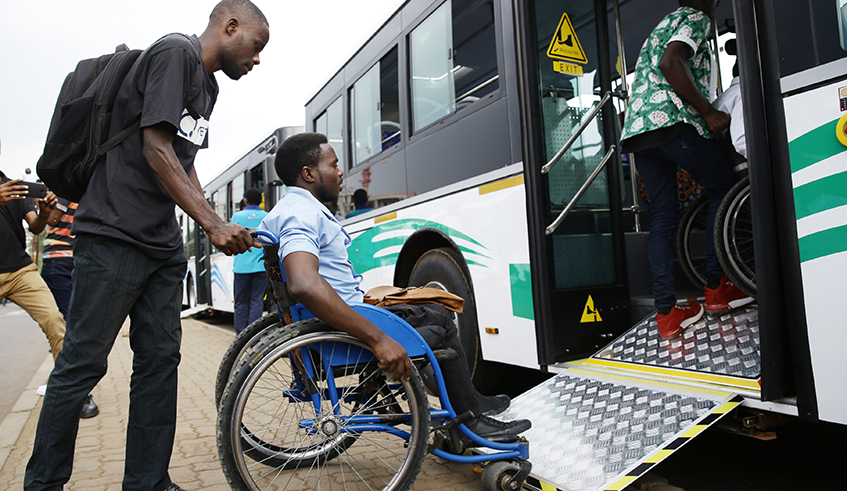

On May 31, Rwanda adopted a national policy to help ensure that persons with disabilities enjoy full inclusion in society and equal participation in Rwanda’s transformation agenda. For the country’s more than 446,000 persons with disabilities, it was a milestone—but it is not enough.
Policies alone cannot change the daily reality of exclusion for persons perceived not only as "disabled” but, all too often, also as in need of being healed, fixed or hidden, because this is the way we generally regard disability. By extension it means that we think of non-disabled bodies as more ‘normal’, healthier, and better. This inevitably leads to disrespect, stigma and discrimination—and the design of systems, standards and norms that are adjusted to non-disabled bodies.
In order to achieve the aims of Rwanda’s new policy, we must also change our mindsets. Rather than regarding a person with disabilities as broken, and those without disabilities as normal, we should consider how both attitudes and societal barriers can either enable or disable.
Consider the situation of a deaf person dreaming to become a medical doctor; she/he cannot succeed without the use of sign language in medical school. The person may also miss this opportunity due to the widespread belief that deaf people cannot be doctors. She/he will be disabled by the attitude of others, or by societal barriers, not by her/his impairment or difference.
In my work with the United Nations Development Programme (UNDP) in Rwanda, I have had the opportunity to work closely with persons with disabilities across Rwanda for the past several years, and this has been a very rich learning experience. Through these personal interactions I have come to see how attitudes can contribute to disability, whether intentionally or unintentionally. When we do not understand a person’s full worth, it becomes easy to be dismissive, demeaning, or just to fail to take notice.
One UNDP project supported the educational achievement of learners with albinism, who are often perceived as less intelligent and left behind in the classroom. We found that their learning challenges disappeared when they sat in front of the classroom and had access to exam papers printed in larger fonts. The cause and effect was logical - eyesight of persons with albinism is often compromised resulting in blurred vision or short- and long-sightedness.
The Organization for the Integration and Promotion of Persons with Albinism (OIPPA) further advocated for simple classroom reforms with the Rwanda Education Board. Ultimately, all learners with albinism in Kigali that were supported with large-font texts passed their national examinations and were recommended for higher education levels. Small changes made a world of difference in the lives of these individual learners.
Globally about 15% or 1 billion people have some type of disability. Disabling attitudes and societal barriers isolate millions of people, deprive them of opportunity, and rob the broader society of their talents. Available data show that globally the proportion of persons with disabilities living under the national or international poverty line is higher, and in some countries double, than that of persons without disabilities. Persons with disabilities face increased risks of poverty, fewer educational and employment opportunities, and poorer health outcomes.
This is also true in Rwanda. According to the 2017 Fifth Integrated Household Living Conditions Survey (EICV5), literacy rates among those 15 and above are substantially different between persons with and without disabilities (43% and 75% respectively). What’s more, only 28% of women with disabilities in rural areas are literate. The 2015 Comprehensive Food Security and Vulnerability Analysis (CFSVA) Report indicates that about 25 percent of household heads in severely food insecure households are disabled, compared to only nine percent in food secure households.
If we can stop thinking about disability in terms of what is right or wrong with a person’s physical or intellectual capacity, we can start to understand that it is not the disability itself that disables a person but the barriers society places in front of persons with disabilities. These barriers can be physical or behavioural and attitudinal. Picture a blind person who wants to cross an intersection with traffic lights in Kigali: she/he cannot do this safely because the signals used all over the city (red-orange-green) are only suitable for the non-visually impaired. The use of Accessible Pedestrian Signals (APS) would remove this barrier entirely. APS is a push button for pedestrians that communicates when it is safe to cross the street through audible tones, vibrating surfaces or speech messages.
Along with Rwanda’s legal framework, the new national policy affirms the inherent dignity, worth, and human rights of persons with disabilities, and aligns with the Constitution of Rwanda and the United Nations Convention on the Rights of Persons with Disabilities (UNCRPD), which Rwanda ratified in 2008.
Implementation of the policy will go a long way in setting standards and regulations for inclusion of persons with disabilities and ensuring equal access to opportunities.
At the same time, it is up to all of us to examine our own attitudes and behaviours, so that we enable, rather than disable, persons with varying abilities.
It is not only the responsibility of persons with disabilities to adjust, but also the responsibility of society, and each of us, to include persons with disabilities in every-day life. We can and must do better. Even if only one life unfolds differently because of our actions, it would have been worth the effort.
Gertie Steukers is a social and political scientist who leads the UNDP Rwanda program to expand social inclusion of persons with disabilities and strengthen civil society organizations.


